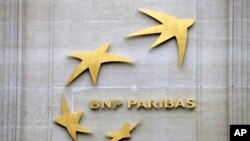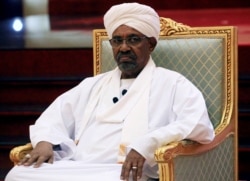Sudanese victims of war crimes Thursday filed a criminal complaint against French bank BNP Parisbas for alleged complicity in human rights abuses committed by Sudan’s regime.
BNP Parisbas has been targeted before over its dealings with Sudan. In 2015, a U.S. judge sentenced the bank to five years of probation and fined it nearly $9 billion after it pleaded guilty to violating United States sanctions against not only Sudan, but also Iran and Cuba.
This case is different: Rights activists say it’s the first effort to hold the bank criminally responsible for alleged complicity in crimes against humanity, genocide and torture in Sudan between 2002-2008. It says BNP was essentially acting as the de-facto central bank for the regime of former president Omar al-Bashir during that period, by allowing it access to financial markets.
“These crimes do not occur in a vacuum and no funds,” said Cynthia Tai, executive director of U.S.-based nonprofit Project Expedite Justice, one of the rights groups supporting the Sudanese victims in the case.
“They occur because people can buy weapons, they can buy trucks and because people can buy the tools they need to commit these grave violations,” she added.
ICC warrants issued
The International Criminal Court issued arrest warrants against Bashir on war crimes and genocide charges in Sudan’s Darfur region but has been unable to prosecute him in The Hague. The ousted leader is on trial in his home country on corruption charges.
“We can take them to court, and I think that will be a first step,” said Abdalhaleim Hassan, one of the Sudanese filing the complaint. He says the government-backed Janjaweed militia attacked his village in Darfur numerous times, killing people including relatives. Later, as a student rights activist, he says he was imprisoned and tortured. He now lives in the United States.
“My journey to the justice will be long. Not only the bank, but to bring the real criminals to the court,” he said.
BNP could not be reached for comment Thursday afternoon. But a spokesperson told the AFP news agency that it was not aware a criminal probe had been opened and did not comment on judicial processes.
Lafarge cement manufacturer
This is not the first effort to hold French businesses responsible for rights abuses committed overseas. Authorities here are looking into whether Lafarge cement manufacturer paid the Islamic State group to keep its factories running in areas it controlled in Syria.
Anjali Sualy is a lawyer for the Paris-based International Federation for Human Rights, which is also supporting the Sudanese victims.
“We hope that by taking the step that we have today, we’ve put these companies on notice that they need to be aware that these types of business deals are risky,” Sualy said.
French investigating magistrates must now determine whether the Sudanese complaint is admissible and whether to open an investigation.









